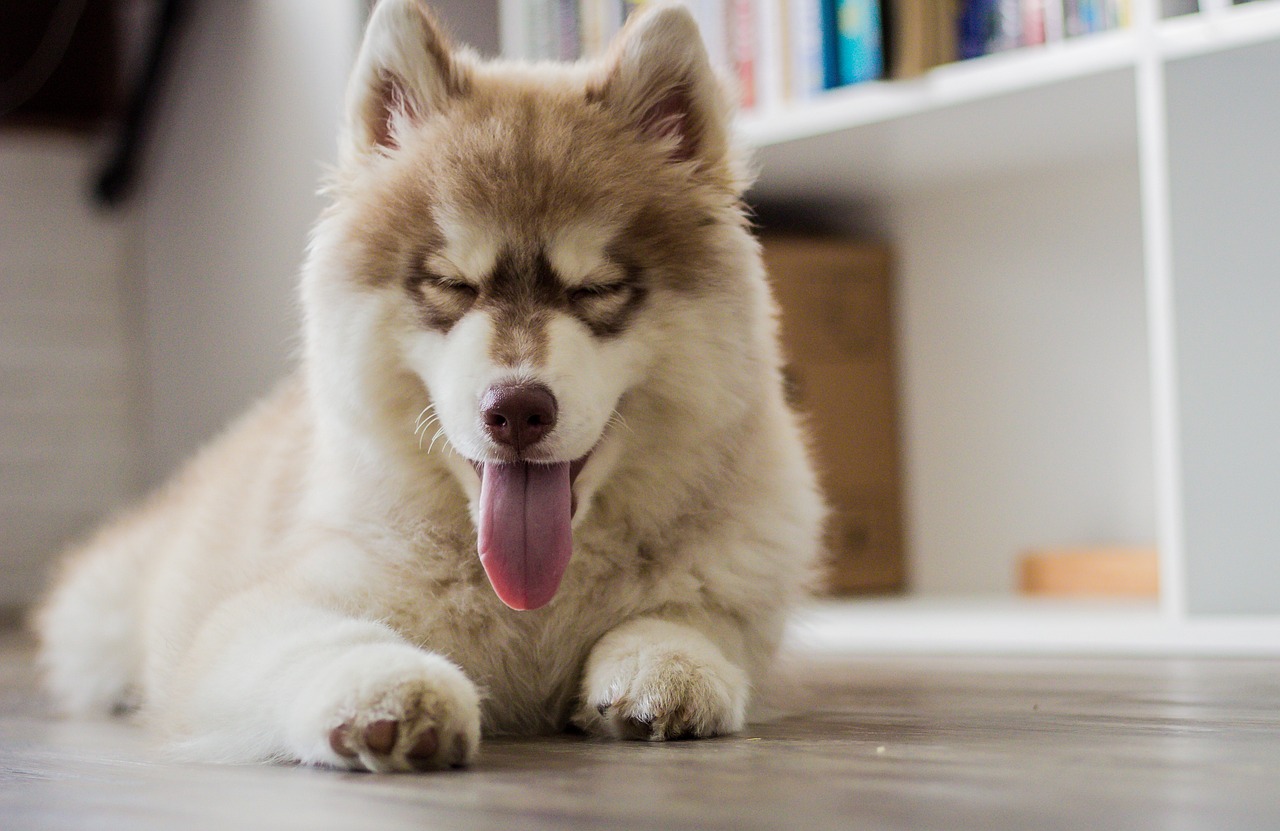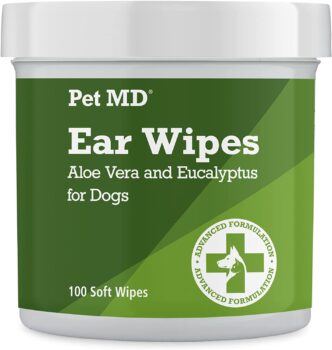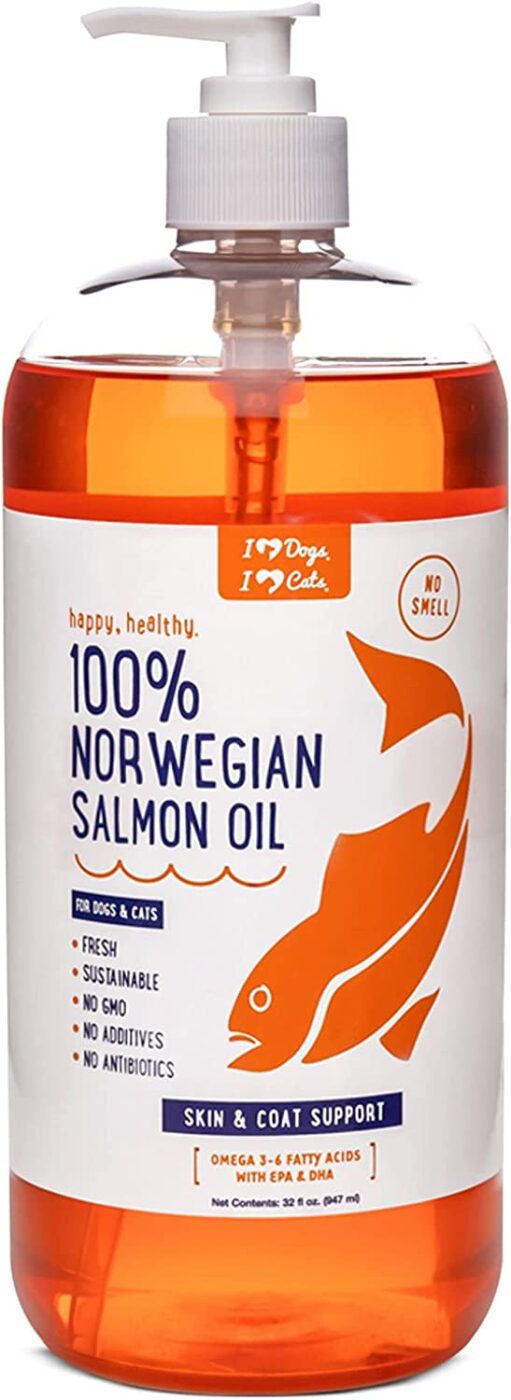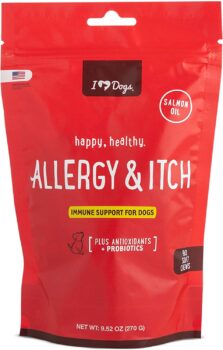Huskies, with their stunning blue eyes and playful demeanor, are beloved pets. However, they’re prone to various health issues, including ear infections. This article outlines 11 ways to treat and prevent ear infections in Huskies, highlighting the importance of Omega-3 fatty acids in their diet.
iHeartDogs is reader supported. Some of the links below may be paid affiliate links, where we receive a small commission on a product at no additional cost to you.
1. Regular Ear Cleaning
Clean your Husky’s ears once a week to remove wax and debris, which can lead to infections. Use a vet-recommended ear cleaner and avoid inserting anything into the ear canal.
Our favorite ear cleaner is these PetMD brand ear wipes on Amazon.
2. Keeping Ears Dry
Moisture in the ears can promote bacterial growth. Ensure to thoroughly dry your Husky’s ears after bathing, swimming, or in wet weather conditions.
3. Regular Vet Check-ups
Regular veterinary visits help detect potential ear infections early. Your vet can also provide professional cleaning and preventive advice.
4. Balanced Diet
A balanced diet enhances your Husky’s overall health, strengthening their immune system to ward off infections. Particularly, Omega-3 fatty acids offer several health benefits.
5. Omega-3 Supplements
Omega-3 fatty acids have anti-inflammatory properties that help combat allergies, a common cause of ear infections. Including these in your Husky’s diet can help manage allergies and reduce ear infection risks.
We’re fans of this Norwegian salmon oil on Amazon. It’s a bright orangish-pink color and has no fishy smell at all due to it’s ultra high purity.
6. Allergen Awareness
Monitor your Husky’s potential allergies. Excessive scratching or head shaking after exposure to certain foods or environments might indicate an allergic reaction. Identifying these allergens can significantly reduce the risk of ear infections.
A few good supplements to help your dog’s allergies are apple cider vinegar, quercetin, and colostrum, all of which are found in many natural allergy supplements like this one.
7. Topical Treatments
Your vet may recommend topical treatments containing hydrocortisone for minor infections. These can help reduce inflammation and itching. Always consult your vet before starting any new medications.
8. Oral Antibiotics
In severe cases, oral antibiotics may be required. Be sure to follow your vet’s instructions and complete the full course of medication to fully eliminate the infection.
9. Surgery
In chronic or severe cases that don’t respond to other treatments, surgery might be necessary. Total Ear Canal Ablation (TECA) can provide a permanent solution.
10. Regular Exercise
Exercise helps maintain a strong immune system, which is crucial for preventing infections. Regular physical activity improves blood circulation, which benefits overall ear health.
11. Preventive Medications
If your Husky has a history of recurring ear infections, your vet may suggest specific preventive medications.
Here are some frequently asked questions about Huskies and ear infections.
FAQs
1. What are the symptoms of ear infections in Huskies? Common symptoms include frequent head shaking, scratching, redness, swelling, a foul smell, or discharge from the ear.
2. Can Huskies suffer from chronic ear infections? Yes, if left untreated, or if the underlying cause isn’t addressed, ear infections can become chronic in Huskies.
3. Are certain Huskies more prone to ear infections? Yes, Huskies with allergies or those who frequently get their ears wet may be more prone to ear infections.
4. How often should I clean my Husky’s ears? Clean your Husky’s ears once a week. If they swim often or have a history of ear infections, more frequent cleaning may be necessary.
5. What should I avoid when cleaning my Husky’s ears? Avoid using cotton swabs, which can push debris further into the ear canal. Also, avoid alcohol or vinegar, as these can irritate the ear.
6. Can diet help prevent ear infections in Huskies? Absolutely. A balanced diet, particularly one rich in Omega-3 fatty acids, can boost your Husky’s immune system and reduce the risk of ear infections.
7. How are allergies linked to ear infections? Allergies can cause inflammation and excess wax production in the ear, creating an ideal environment for infections.
8. Can Omega-3 supplements cure ear infections? While Omega-3 supplements can aid in prevention and recovery, they are not a cure for existing infections. They should complement, not replace, a vet’s prescribed treatment.
9. When should I consult a vet if I suspect an ear infection? Consult your vet immediately if you suspect an ear infection. Early treatment is key to prevent complications.
10. Is surgery common for ear infections in Huskies? Surgery is typically a last resort, usually recommended for severe or recurring infections that do not respond to other treatments.
In conclusion, maintaining your Husky’s ear health requires regular attention and care. Regular ear cleaning, a diet rich in Omega-3, and routine vet check-ups are key steps to prevent ear infections. Remember, a healthy Husky is a happy Husky!




1 Comment